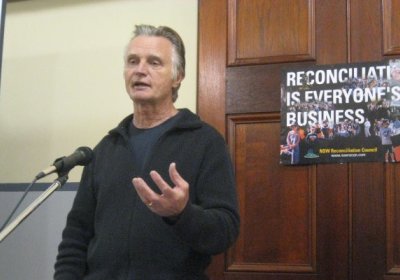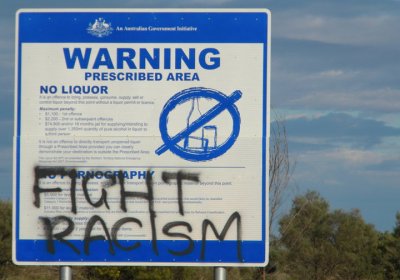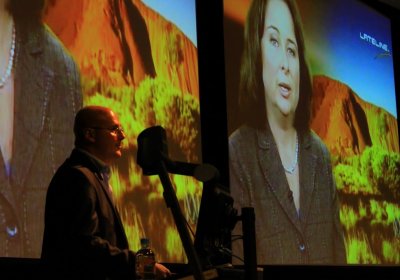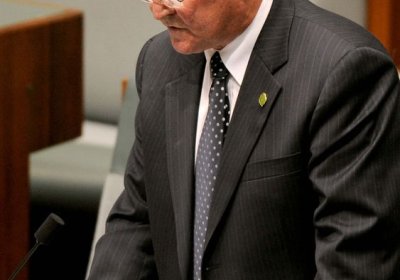Aboriginal workers in the Northern Territory "want to work, want to have a go”, Aboriginal activist Mark Fordham told 60 people at Brisbane’s Kurilpa Hall on October 24. Fordham is a former Community Development Employment Projects co-ordinator at Ampilatwatja community and is a member of the Liquor Hospitality and Miscellaneous Workers’ Union.
Fordham had spent the previous two weeks touring the east coast, speaking with unions and community groups about the effect the federal government’s intervention into NT Aboriginal communities has had on employment.
Northern Territory Intervention (NTER)
Mark Fordham, an Aboriginal activist from the Northern Territory and member of the Liquor Hospitality and Miscellaneous Workers Union, is touring the east coast to raise awareness about the jobs with justice campaign. The campaign aims to force the government to provide real jobs and services to remote Aboriginal communities in the NT (see article page 7).
In Sydney, Fordham spoke to waterside workers with Maritime Union of Australia (MUA) officials. He thanked maritime workers for their solidarity with the Gurindji workers who walked off Wave Hill station in 1966.
On October 20, 200 people gathered in the community of Kalkarindji to protest against the policies of the Northern Territory intervention, launched in 2007 by the Howard Coalition government.
Under the intervention, Aboriginal welfare recipients in the NT have half their pay “quarantined” onto a Basics Card, which can be used only in approved stores and only for food, clothing and medical supplies.
The Greens and the Australian Labor Party signed an agreement on September 1 to form a minority government on certain conditions, one of which was support for amendments to the constitution to recognise Aboriginal people. The government has agreed to hold a referendum on the issue.
The proposal has sparked debate among Aboriginal activists about its usefulness for the Aboriginal rights struggle.
Amnesty International’s Demand Dignity and Eora College art exhibition opened at the Boomalli Aboriginal Arts Gallery on September 22 to a crowd of 50 people. The exhibition was based on the theme of the UN Declaration on the Rights of Indigenous Peoples. The artworks were produced by talented students from the Eora TAFE College.
The Demand Dignity campaign aims to eradicate poverty by making human rights law. As part of the campaign, Amnesty International has criticised Australia’s NT intervention policy, which was launched by the Coalition government of John Howard in 2007.
The following speech was delivered by Jeff McMullen to a September 8 meeting in Parramatta, organised by Reconciliation for Western Sydney.
The United Nations Committee on the Elimination of Racial Discrimination (CERD) slammed the policies of the Northern Territory intervention in a report released on August 27.
A 2006 episode of the ABC’s Lateline program led directly to the greatest human rights abuse in the past half century, said founder and former editor of the National Indigenous Times Chris Graham, at a public forum of 150 people in Sydney on September 3.
The Socialist Alliance national office has produced its analysis of the August 21 federal election. It traces the precise mix by electorate of the increased Green, Coalition, independent and informal vote, produced as voters deserted Labor.
The differences among the seat-by-seat contests in an Australian federal election have never been so great. The general disillusionment with the two major parties expressed itself in quite different ways in different electorates and areas.
Two of the central figures in a major media and government scandal that erupted in the lead-up to the launch of the Northern Territory intervention will speak in Sydney on September 3, in their first public engagement together.
Tjanara Goreng Goreng, a former Howard Coalition government official-turned-whistleblower, and Chris Graham, the founding editor of the National Indigenous Times, will speak address a public forum, at the University of Technology, Sydney, hosted by the Stop the Intervention Collective Sydney (STICS).
Voters’ stunning rejection of both major parties has left neither likely to form a government in its own right. Whichever party governs, it will have to rely on the support of at least three and probably four independents, with Andrew Wilkie's chance of taking Denison from Labor firming.
Greg Eatock, a well-known Indigenous activist in Sydney, passed away aged just 51 on August 24. His early death, from chronic health problems, was more proof of the shameful 11.5-year gap in life expectancy between Indigenous and non-Indigenous males in Australian.
One of Greg's brothers, Ronald, had already passed away, aged 27.
Greg came from a family with a four-generation history of political activism. His great grandmother, Lucy Eatock, and her husband William were veterans of the great 1890s shearers’ strike. Lucy later moved to Sydney from Queensland.
- Previous page
- Page 4
- Next page









